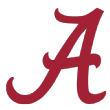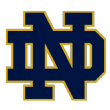The College Football Playoff selection committee has spoken, and right or wrong, it has chosen the four teams that still have a shot at the national championship. Defending champion Alabama will play Oklahoma in the College Football Playoff Semifinal at the Capital One Orange Bowl, and Clemson will play Notre Dame in the College Football Playoff Semifinal at the Goodyear Cotton Bowl Classic on Dec. 29. Here's a look at how all four teams got to this point.
No. 1 Alabama

Preseason AP Top 25 ranking: 1
What they want us to remember: They have two good quarterbacks.
What they want us to forget: Their Heisman Trophy hopeful is struggling and hurt.
The skinny: The SEC championship was supposed to be a coronation for Alabama. Instead, it became a close call for the once seemingly unbeatable Crimson Tide.
After running the table during the regular season, after running roughshod over the entire conference and winning every game by three touchdowns or more, coach Nick Saban's squad was nearly stopped dead in its tracks by Georgia.
The defense could do nothing to stop the arm of Jake Fromm or the lightning-quick feet of D'Andre Swift on Saturday night in Atlanta. To make matters worse, the once golden touch of quarterback Tua Tagovailoa turned sour as the Heisman Trophy front-runner wilted under pressure, throwing two costly interceptions before rolling his ankle and leaving the game.
During a season in which everything appeared to go as planned for the wire-to-wire No. 1-ranked team, it was deliciously ironic that backup quarterback Jalen Hurts would come off the bench to save the day, throwing the game-tying touchdown and running in the go-ahead score with 1:04 left.
The game appeared to signify something that ought to scare the rest of the college football world: Nothing, not even a game in which Alabama's stars struggled and injuries occurred, has yet to derail the defending national champs.
There will be questions about what happens next and how Saban will manage the quarterbacks and the defense moving forward. But for now, Alabama is safe. -- Alex Scarborough
No. 2 Clemson

Preseason AP Top 25 ranking: 2
What they want us to remember: The roster filled with stars who've done this all before -- from left tackle Mitch Hyatt to defensive tackle Christian Wilkins. Add in the superstar potential of freshman quarterback Trevor Lawrence, and Clemson shows similarities to 2016's Deshaun Watson-led championship team, only a bit older and wiser.
What they want us to forget: A secondary that was torched by Texas A&M's Kellen Mond and South Carolina's Jake Bentley, and the inexperience of a true freshman quarterback.
The skinny: For a team predicted to sail into the playoff, Clemson has both lived up to expectations and also endured its share of speed bumps. From the early QB controversy that ended with Kelly Bryant transferring and Chase Brice rescuing the team from a near-loss to Syracuse to the ongoing concerns about the play at safety and how the defense will stack up against an elite offense, it's been a season of both big questions and dominant performances.
As the Tigers prepare for the playoff, this still has the feel of a team just starting its journey. Getting here was nearly predestined in the down ACC and with a veteran-laden roster led by Wilkins, Clelin Ferrell and Dexter Lawrence. Nearly every key cog, save Trevor Lawrence, has been here before, and nothing about the experience will surprise them.
That makes Trevor Lawrence the true wild card. While Tua Tagovailoa has become the poster boy for injecting new life into an offense, Lawrence has done much the same at Clemson. He ascended to QB1 after beating out Bryant in September, and he has taken consistent strides each week as he has grown comfortable with his role. There have been a few freshman hiccups, but not many. Meanwhile, his arm strength, athleticism and pocket presence have added a new dimension to Clemson's offense. Add in the dynamic running of Travis Etienne and a receiving corps as deep as any in the country, and the Tigers' offense appears well ahead of the unit that struggled against Alabama in last season's Sugar Bowl.
But it will be the defense that tells the story of this playoff run. Wilkins, Ferrell and Austin Bryant all returned to school for a final season with the intention of adding another championship ring. The season has built to this point, and they're not interested in settling for anything less than another national championship trophy. -- David M. Hale
No. 3 Notre Dame

Preseason AP Top 25 ranking: 12
What they want us to remember: A perfect regular season, the quarterback switch to Ian Book and a blowout in the Bronx against Syracuse.
What they want us to forget: The back-to-back clunkers against Ball State and Vanderbilt, and the first half against both Pitt and USC.
The skinny: Notre Dame coaches and players were surprisingly (and refreshingly) candid about their goals for 2018 after falling out of the playoff race last November.
"I don't think our eyes are on anything less than a national championship," linebacker Drue Tranquill said.
"We don't have anything else to play for," coach Brian Kelly added.
The Irish earned the opportunity for the first time in the CFP era by posting their first perfect regular season since 2012, when they advanced to the BCS National Championship. They did it with a defense that went from dramatically improved in 2017 to nationally elite this fall under first-year coordinator Clark Lea. Notre Dame stifled Michigan in the opener, never allowed more than 27 points and held eight opponents to 17 points or less.
There was a bit more drama on offense, as Notre Dame switched quarterbacks after Week 3. Book, who threw the winning touchdown against LSU in last season's Citrus Bowl, replaced Brandon Wimbush and flourished, throwing at least two touchdown passes in all eight of his starts and completing better than 71 percent of his passes in his first five starts.
Notre Dame structured its offseason on handling chaos, with an eye toward a quirky closing five-game stretch that featured trips to San Diego, Chicago, Yankee Stadium and Los Angeles and only one home game. But a mature and sound team navigated November, punching its first playoff ticket a week early with a 24-17 victory over rival USC on Nov. 24. -- Adam Rittenberg
No. 4 Oklahoma

Preseason AP Top 25 ranking: 7
What they want us to remember: A historically efficient and devastating offense, headlined by Heisman Trophy hopeful Kyler Murray.
What they want us to forget: The defense, which is easily the worst of any legitimate contender of the playoff era.
The skinny: Oklahoma lost a Heisman winner and the No. 1 overall player taken in the NFL draft after last season. And yet even with quarterback Baker Mayfield gone, the Sooners somehow became more lethal offensively this season.
Behind Murray, Oklahoma led the country during the regular season in scoring, yards and efficiency, putting together an offensive attack that was completely unstoppable. Marquise "Hollywood" Brown delivered another banner year with blazing speed from the outside, and together with CeeDee Lamb, the Sooners boasted one of the top receiving duos in college football. Up front, the offensive line continued to overpower opponents, and freshman Kennedy Brooks proved to be a revelation at running back, stepping in for the injured Rodney Anderson at midseason to rush for nearly 1,000 yards.
Not all went smoothly for Lincoln Riley in his second season as head coach, especially on the defensive side. After Oklahoma surrendered 48 points to Texas in October, Riley fired defensive coordinator Mike Stoops, the brother of Bob Stoops, whom Riley succeeded. But as bad as they were under Mike Stoops, the Sooners were even worse defensively under interim coordinator Ruffin McNeill before bouncing back with their best performance in the Big 12 championship.
None of that prevented Oklahoma from winning, though, as the Sooners became the first team since the advent of The Associated Press poll in 1936 to win four consecutive games in which they gave up more than 40 points.
While the defense made improvements late, the Sooners didn't make the playoff because of it. Thanks mostly to Murray's brilliance, they got there in spite of it. -- Jake Trotter
